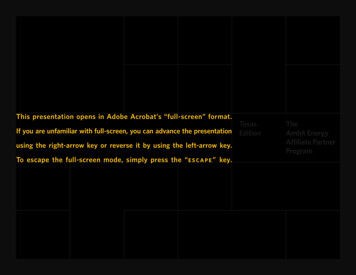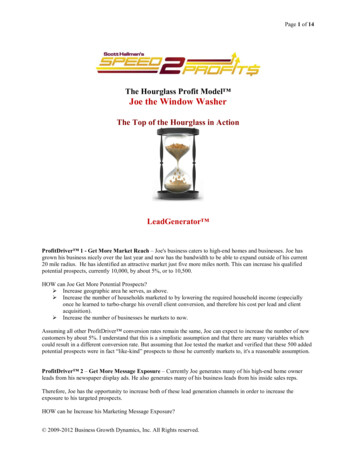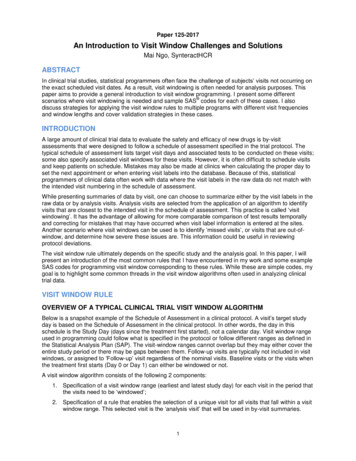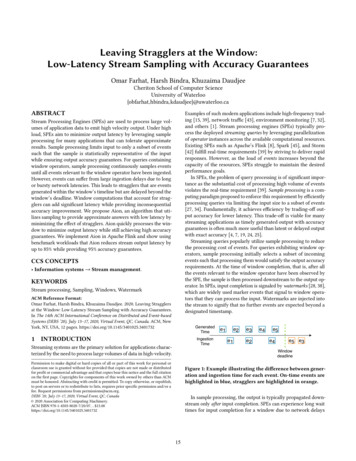
Transcription
Your Window to the World
CONTENTSMISSION. 1Welcome: letter from the director.1The college’s mission.1ADVISING (Undergraduate Programs). 2Mission.2Who, what, when, and where.2Student and advisor responsibilities.3The technology imperative (laptop requirements).4Scholarships.4HONORS PROGRAM. 5Global Leadership Scholars.5ADMISSION. 6Acceptance into the College of Business Administration.6Internal and External Transfer Admission.6Business minor.6CURRICULUM. 7Structure of the curriculum.7General education requirements.8Pre-business core. 10Business core. 11Majors. 12Optional second majors. 12Diagram of all majors, collaterals, and dual concentrations. 13MAJORS (structures, academic plans, study abroad opportunities, and more).14Accounting. 14Business Analytics. 16Economics. 19Public Administration. 21Finance. 22Human Resource Management. 24Management. 26Logistics. 28Marketing. 31INTERNSHIPS.34UNIVERSITY POLICIES AND PROCEDURES.35Table: graduation requirements. 38Table: the university’s academic calendar, 2011-2012. 39Table: advanced placement credit. 40Table: how to remove high school deficiencies. 41OPPORTUNITIES.42Honor societies and student organizations. 42RESOURCES.44BUILDING CODES.inside back cover
MISSIONWelcomeDear Students:Welcome to the College of Business Administrationat the University of Tennessee. We have created thishandbook to assist you with your academic career. Youshould use this handbook in conjunction with UT’sonline Undergraduate Catalog and Hilltopics (the officialhandbook for all university students). Hold on to thisbook. The answers to many of the questions you nowhave and will ask during the year can be found here.With that said, allow me to introduce myself. I am theDirector of Undergraduate Programs located in 342Haslam Business Building. The goal of our office is tohelp you design your academic strategy as you pursueyour individual aspirations. We will challenge you totake responsibility for your intellectual developmentand make the choices that will culminate in youreducation.As you know, not all learning occurs in the classroom.In many cases, your experiences with problem solving,negotiating the university system, working withfaculty and staff, and assuming responsibility for youreducation are the most critical components of youruniversity experience.I am very privileged to work in a profession where Ispend the majority of my time revealing opportunitiesand helping individuals fulfill their dreams. My staffand I look forward to assisting you in any way we can.Sincerely,Fred A. Pierce IIIDeveloping Mindful Leaders of Worthy EnterpriseBusiness is everywhere: when you put gas in your car,when you check your e-mail, when you turn on yourtelevision, when you read a book or magazine, whenyou turn out the lights, and when you walk down thestreet.For these businesses to succeed, they must operateon sound principles while always adapting tochanges in the business environment. In fact, theCollege of Business Administration succeeds in muchthe same way – operating on sound educationalprinciples while adapting to change.It is our goal to prepare you to function in today’sbusiness environment. You are our customer. Ourproducts are our curricula, programs, scholarships,and advising. Our service is to enable you toadvance your career while providing you with thepractical knowledge to prosper.The mission of the College of Business Administrationis to develop mindful leaders of worthy enterprise. Weaccomplish this mission through maintaining anappropriate balance of degree programs, research,executive education, outreach, and lifelong learning.With respect to the undergraduate program, theCollege of Business Administration emphasizesconstant curriculum innovation, the globalization ofall degree programs, and the implementation of newlearning technologies.Page 1
ADVISINGCollege of Business Administration Undergraduate ProgramsMissionThe mission of the college’s Undergraduate ProgramsOffice is to provide comprehensive academic andeducational program planning that promotes integrityand responsibility within a diverse environment. Weaccomplish this mission through academic planning,management of the admissions process, recruitment andretention, management of student data and enrollment,and administration of scholarship programs.Central to every one of our activities is the academicadvising experience. Achieving our mission requires acollaborative effort between students and advisors.Academic AdvisingUT VisionAcademic advising at the University of Tennessee willbe recognized for effectively fostering student successthrough implementation of exemplary practices.UT MissionThe University of Tennessee recognizes academicadvising to be a critical component of the educationalexperience and student success. Faculty, administrators,and professional staff promote academic advising as ashared responsibility with students. Academic advisingserves to develop and enrich students’ educational plansin ways that are consistent with their personal values,goals, and career plans, preparing them for a life oflearning in a global society.Advising in the College of Business Administration(Who, What, When, and Where)declared a major within a specific college), the College ofBusiness Administration considers academic planning tobe so critical that we require our students to meet withan advisor every fall and spring semester.Our centralized advising delivery allows you to choosean academic advisor with whom you can continue toconsult throughout your academic career. Advisingis much more than simply a time to select courses forthe next semester; it is an opportunity for you and youradvisor to develop and evaluate the academic plans thatwill enable you to reach your academic goals.Once you begin taking 300-level courses in your major,academic advising is supplemented with career andprofessional advising from faculty members in yourmajor. Once per term, the faculty will invite you toan open forum so you can learn about professionalopportunities and get to know the faculty and theirinterests. You should identify faculty in your major withwhom you share common interests and communicatewith them regularly.The Undergraduate Programs Office delivers academicadvising in 342 Haslam Business Building on anappointment basis. Appointments are normally offered onthirty-minute individual intervals. The earliest appointmentcan be scheduled for 8:30 a.m., and the latest can bescheduled for 4:00 p.m. To schedule an appointment, signup online at http://bus.utk.edu/undergrad.Hours of operation are from 8:00 a.m. to 6:00 p.m.(Eastern), Monday through Thursday, and 8:00 a.m. to5:00 p.m. (Eastern), Friday.DEFINITIONSAcademic advising is an integral part of your universityexperience. While the university’s policy requiresstudents to have one mandatory academic planningsession per year (unless you have earned fewer than 30hours at UT, are on academic probation, or have notWhat exactly do we mean by “collaborative effort”?You have to participate, take an interest, and be responsible. It is your future, and no one cares about it more than you.Academic Probation:Students are placed on academic probation when either their cumulative GPA falls below 2.00 for one semester or when their semester GPA falls below 2.00 for two consecutiveterms of enrollment.Page 2
ADVISINGStudent and Advisor ResponsibilitiesTo assist with the success of your academic advisingsessions and your academic career, it is yourresponsibility to schedule an advising appointment EARLY eachsemester review your curriculum online at http://bus.utk.edu/undergrad or through this Student Handbook or theonline Undergraduate Catalog at http://catalog.utk.eduIt is your advisor’s responsibility to be accessible to you during reasonable hours provide a means through which you can scheduleappointments understand the curriculum, graduation requirements,and university policies provide accurate information discuss specific university, college, and departmentalrequirements, procedures, and deadlines help you define and develop realistic goals anddiscuss the linkage between academic preparationand career opportunities assist you in planning programs of study, bothshort-term and long-term, that are consistent withyour abilities and interests, by considering courseload, academic background, program demands, andemployment or personal commitments ensure you are meeting academic retention standards write down a tentative plan for next semester and anyquestions you have for your advisor keep copies of your relevant academic records be aware of course prerequisites and corequisites andselect appropriate courses consult with your advisor before making drasticchanges to an agreed-upon schedule consult with your academic advisor on issuesrelated to academic progress, a change in program,registration for study abroad, internships and co-ops,courses to be taken at another institution, withdrawalfrom courses, or withdrawal from the university help you identify special needs and acquaint you withservices and programs provided by the college andthe university refer you to other services, departments, and specificindividuals as special needs are identified be aware of academic policies and procedures (seepages 35-37 for detailed information) be aware of campus resources and support systemsthat promote academic successmonitor your progress toward educational goalsand keep accurate, up-to-date records of academicprogress assist in the petitioning process for exception topolicy respect your right to privacy of educational recordsand discuss confidential information only withappropriate individuals and for the purpose of servingyour best interests help you assume responsibility for your decisions andactionsbe aware of career and professional developmentopportunities available, as well as on-campus supportfor identification and exploration of career paths critically reflect on academic and career goals understand the importance of enhancing your degreewith co-curricular and inter/intra-cultural experiences make final decisions and take responsibility for youracademic career understand your responsibilities as an educatedcitizen of UT and of a democratic, diverse, and globalsocietyDEFINITIONS Course Load:Full-time course load is 12 hours. The maximum number of hours you can take in a fall or spring semester is 19. Most students take 15 to 16 hours. You can take a maximum ofthree hours in mini-term and 12 hours in summer.Your Right to Privacy:Did you know that without your consent, we are not allowed to discuss your academic record with anyone, including your parents? If you want us to be able to discuss your recordswith your parents (or anyone else you designate), please obtain and complete a consent form in 342 Haslam Business Building. You can also specify the particular aspects of youracademic record we may discuss with the persons you identify. For your protection, your completed consent form expires at the end of each academic year. Additional informationmay be obtained at http://ferpa.utk.edu.Page 3
ADVISINGLaptopsScholarshipsWhen you are admitted to your major in the Collegeof Business Administration, you are required to havea laptop computer. Exposure to and mastery oftechnology prepare you to excel in today’s networkdriven business environment. The College of BusinessAdministration has integrated technology into itscurriculum in a number of ways, including the use ofthe university’s campus-wide wireless network and ourcourse-management system—called “Blackboard”—athttp://online.utk.edu. You will use your NetID to accessthe Blackboard system, as well as other universityservices.A limited number of scholarships are available forhighly qualified students. Selection criteria consideredfor scholarships include academic merit, financialneed, and leadership. The college offers three types ofscholarships: college, departmental, and study abroad.You have two sources for technology support oncampus:Bookstore Technology Centerhttps://utbookstore.org/technology(865) 974-2930 To be
Your Window











